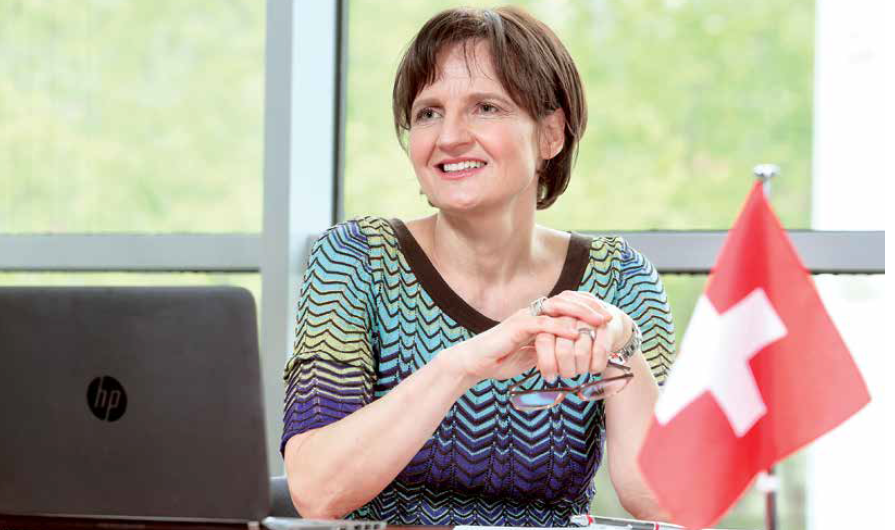We must all envision a more inclusive world and a more inclusive Serbia for the benefit of all. Therefore, through the Swiss Cooperation Strategy Serbia 2018-2021, we particularly support the efforts of the Serbian government to increase economic growth, reduce poverty, inequalities and exclusion

Since its adoption in 2015 and even before, the 2030 Agenda for Sustainable Development has driven Switzerland’s commitment for sustainable development both at home and abroad, says Ursula Laeubli, Director, Swiss Cooperation Office (SCO), Counsellor, Embassy of Switzerland. In the Swiss Cooperation Strategy for Serbia 2018-2021, which the SCO implements in Serbia, SDGs are taken up in all fields – governance, economic development and employment and sustainable energies. “Switzerland has been highly engaged in the process of drafting the 2030 Agenda due its long lasting commitment for inclusive economic development at local and national level, for an inclusive society and environmental issues”, explains our interlocutor. Despite of the fact that all 17 SDGs are equally important, Switzerland recognized water, health, gender equality and peace as crucial, altogether with some crosscutting issues such as sustainable consumption and production and reducing disaster risks. As a starting point, Switzerland has conducted a baseline and a gap assessment for all SDG’s and elaborated its first Voluntary National Review. Both will be presented at the next High-level Political Forum on Sustainable Development. “One lesson learnt for allowing a sound implementation of the Agenda is the need for more cross-sectoral exchange and networks at different government level and stronger cooperation with all relevant stakeholders – citizens, civil society, private sector and the scientific community”, notes Laubli.
How do you see Serbian results in the achievement of 2030 Agenda so far and what is the framework of Swiss bilateral support to Serbia within the context of SDG?
— Serbia actively participated in the global consultative process and drafting the UN 2030 Agenda. The SDGs are generally well covered within public policies in the Republic of Serbia through strategic documents of the Serbian Government as well as sectoral strategies. In our cooperation with Serbia we consequently incorporate the SDG agenda; our constitution laysthe basis for the Swiss dedication to a world without poverty and in peace for sustainable development. In the Swiss Cooperation Strategy Serbia 2018-2021, the SDGs are immersed in all fields. Within the field of governance, targets of SDG 5 (Gender Equality) and SDG 16 (peace, justice and strong institutions) are covered. Support related to economic development and employment incorporate targets of SDG 4 (Quality Education) and SDG 8 (Decent work and economic growth), while the third field of Swiss Support – sustainable energies covers SDG 7 (Affordable and Clean Energy) and SDG 9 (Industry, Innovation and Infrastructure) and SDG 11 as well (sustainable cities and communities). Social inclusion and gender equality are cross-cutting policies that Switzerland tries to incorporate in all projects supported in Serbia. Inclusion is also at the core of the 2030 Agenda and reflected in the pledge to leave no one behind.
European accession is the priority of Serbian Government. How this process matches UN 2030 Agenda and what is the position of Switzerland as a partner of Serbian Government between these two policy directions?
— The Interministerial Working Group of the Government of the Republic of Serbia has identified the complementarities between the SDG and the EU accession. However so far there is no single national development strategy that could serve for an integrated approach to the 2030 Agenda. The main goal of Swiss Cooperation Strategy Serbia 2018-2018 is to give support to citizens and Government towards European integration. In the same time, we are trying to cover some areas of SDGs that membership in EU is not related with, even though there are many SDG targets sub goals interconnected with the negotiating chapters. The most important area is certainly socio-economic development, which has been left to each EU member to deal with. The other important detail is that European integration process is oriented towards the public administration as a key stakeholder, while the SDGs are a multisectoral and inclusive topic.
In this perspective what do you see as a necessity for successful fulfilment of 2030 Agenda in Serbia?
— We believe that the 2030 Agenda in Serbia could serve to encourage a public dialogue on development and prioritization of SDG’s in Serbia with reference to the EU negotiation chapters. A widespread consultative process with all actors – citizens, CSOs, young people, academia and all others could give strong support to policy decision makers. The Global UN Agenda is dedicated to life with dignity for all – which is the vision Switzerland is also oriented. Therefore, the concept of SDG itself is inclusive and based on partnership, contribution, commitment, and consultations upon global issues at national and local level. The main assumption of United Nations is that each individualhas a responsibility for achieving the Sustainable Development Goals. Switzerland follows this idea and we want to share it with Serbian citizens and Serbian Government